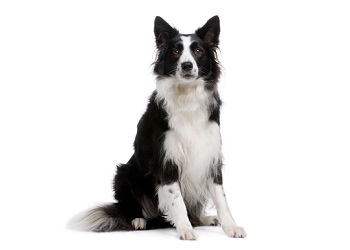 The Border Collie was developed more than 350 years ago by farmers to work their livestock on the border of Scotland and England (more specifically, the county of Northumberland). They proved to be hardworking and relentless, thriving on the mental and physical challenges of herding.
The Border Collie was developed more than 350 years ago by farmers to work their livestock on the border of Scotland and England (more specifically, the county of Northumberland). They proved to be hardworking and relentless, thriving on the mental and physical challenges of herding.
The Border Collie’s ancestral roots lay with the Bob-tailed sheep dog, the Bearded Collie, the Harlequin Collie and the Setter. The breed became known as the ‘Working Collie’. In 1893 ‘Old Hemp’ was bred in Otterburn by a farmer, Adam Telfer, from two of his Working Collies, Roy and Meg. Hemp was recognized as the quintessential working dog and is recognized as the foundation sire of what we recognize today as the Border Collie.
Hindhope Jed, from Old Hemp’s line was imported to Australia in 1901 to work with the mobs in the sheep industry. In 1907, Border Collies entered the show ring. Development of the breed for the show ring has evolved a different standardized appearance to the working Border Collie. Today, the energetic Border Collie is not just an expert sheep dog on the farm but also a high achiever in obedience, agility, flyball and sheep dog trialing.
The Border Collie is highly intelligent and has a ‘high work ethic’ but does have a good ‘off’ switch.
Personality
Border Collies are a lively, kind-natured breed that must be a part of family activities.
Because they are very intelligent and eager to please, formal and informal training along with you is essential from the moment you pick up your Border Collie. Training must be positive and purposeful. Border Collies thrive on mental and physical stimulation and if you don’t provide it for them, then they will create their own, which people see as mischievous misbehavior.
Border Collies’ alert and agile nature and love for their family make them suitable as watchdogs.
Upkeep
The medium-sized Border Collie requires weekly brushing and bathing as needed. It has a double coat that varies from slick to lush, and comes in various colors. The breed’s moderate amount of coat allows for minimal shedding and its particular texture that it forms rarely tangles, if brushed weekly. However, it will require more brushing when shedding coat to remove the loose dead hair and prevent painful matting.
Like all dogs, Border Collies require regular tick, flea, intestinal worms and heartworm treatments. Consult your veterinarian on treatment options. Desexing and vaccination against diseases, such as the deadly parvo virus and highly infectious canine cough, are also important to discuss with your vet.
Border Collies are dogs that need daily interaction with their humans and will enjoy physical exercise, such as a walks, runs or game with a ball or Frisbee at the local park. Ongoing training in one of the dog sports or learning new tricks and practicing the old ones are also fun.
Compatibility
Border Collies need caring, active and patient owners who are willing to train and involve their dog in family activities. Because Border Collies are so energetic, they also need owners who can provide them with love and plenty of attention.
This breed can be boisterous and motion-sensitive if not trained well and included in family activities. Unless you want your dog to be a real part of your family and give it love and attention from the day you bring it home and for the next 10 to 15 years, this is NOT the breed for your family.
They are good with children, however, like with any breed, adult supervision is important around children. Some Border Collies can also get carried away with their herding instinct and nip at energetic children, but this ‘working’ behavior can be controlled by consistent positive training.
Border Collies are suitable for apartment living as long as they get sufficient daily exercise. They do well in a fenced yard with a reasonable exercise area, but more importantly they require YOU. Interesting, good quality toys, such as Kongs, and digging pits (with hidden toys or buried, huge raw marrow bones) are great for Border Collies, and so are interactive toys that squeak, roll, are hard or soft, ‘spiky’, made from different materials or bounce.
For when your Border is not at your feet you must provide comfortable shelter from the heat and cold, and plenty of fresh, clean water in a heavy non tip over bowl – some Border Collies are very water-orientated!
Border Collies can suffer from some hereditary diseases, but tests for these conditions are readily available and used by reputable breeders to eliminate their existence in careful breeding programs. For more information, contact your state Border Collie club.
Fact file
Breed classification Working dog
Size Medium
Lifespan 10-15 years
Origin England / Scotland Border region
Colors Black, blue, red, chocolate, blue merle and tri-color
Cost $1000 – $1200
Common hereditary problems Ceroid lipofuscinosis (CL), Trapped neutrophil syndrome (TNS), Collie eye anomaly (CEA) and Osteochondritis dissecans (OCD).
